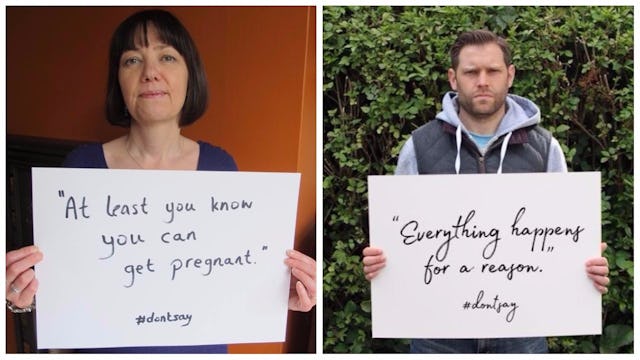Here's What Not To Say To Those Who Have Experienced A Miscarriage

Photo campaign shows knowing what to say to someone after a miscarriage is so important
Experiencing a miscarriage can feel so isolating. To go from the excitement of planning your Pinterest-inspired nursery and tossing around names to experiencing a pregnancy loss is one of the most heartbreaking things in life. Telling friends and family members can fill you with anxiety and dread, and oftentimes — even if they think they’re being supportive — people can say the wrong thing.
The Miscarriage Association is making it a mission to help people understand the difference between being supportive and being (unintentionally) hurtful or tactless when talking to loved ones who have experienced a miscarriage.
The #SimplySay campaign is bringing together women and men who have experienced miscarriage by sharing helpful things to say to loved ones who are suffering. The campaign also focuses on what not to say, because sometimes humans are, well, humans, and don’t realize they’re saying unhelpful things.
Reciting old tropes like “you’ll get ’em next time” or reminding them they’re “lucky” they got pregnant is the opposite of supportive and helpful, no matter how good your intentions may be.
No, Carol, everything doesn’t “happen for a reason” and even if it did, what could *possibly* be the reason for this? Saying something like this is insensitive and unkind.
Couples who have experienced a miscarriage often feel terrified to “try again.” Let them mourn their loss.
While much about miscarriages remains unknown, it’s hardly supportive (or medically accurate) to place blame on the mother. According to the American Pregnancy Association, they are often the result of a chromosomal abnormality — meaning the mother has no control or influence.
Yeah, no. Just don’t say this.
Why? Why would someone think this was acceptable to say?
Oh hell no, don’t say this.
Of course, it’s difficult to find the right things to say to someone who’s grieving a loss. But this campaign offers a great place to start.
Sometimes, a simple “I’m sorry” goes a long way.
“This must be tough for you. I’m so sorry.”
Let them know they’re not alone, and when they’re ready for you — you’ll be there.
Because miscarriage isn’t in anyone’s control, and it’s not anyone’s fault. Let them know you’re angry and hurting for them, too.
Hopefully this campaigns starts a much-needed dialogue about how to dialogue with those we love who have experienced a miscarriage. There are hundreds of photos with suggestions on how to offer support and show you care — which is what grieving parents need the most.